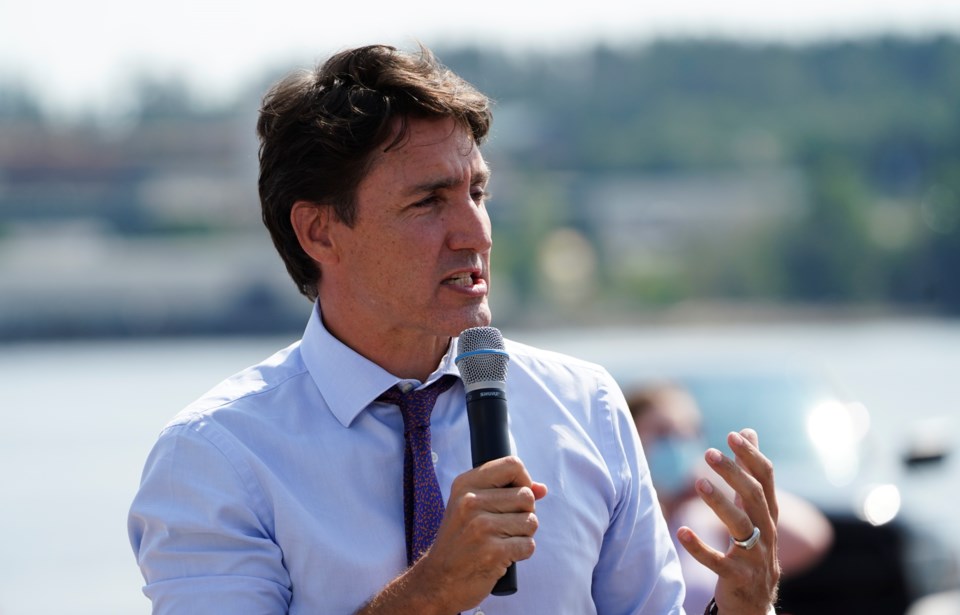UPDATE: 9:10 p.m.
Canadians have chosen another minority Liberal government — almost identical to the one it replaced — to finish the fight against COVID-19 and rebuild the shattered economy.
Precisely how stable a minority remains to be seen, as results were still trickling in and there were tight contests in dozens of ridings as the clock started running out on Monday night.
There are also almost 800,000 mail-in ballots to be counted, starting Tuesday, which could yet change the preliminary results in many of those tightly contested seats.
Late Monday, Justin Trudeau's Liberals were leading or elected in 157 seats — exactly the same number they won in 2019, 13 short of the 170 needed for a majority in the House of Commons.
Erin O'Toole's Conservatives were leading or elected in 121 seats, the same as in 2019 even though they won slightly more of the popular vote than the Liberals, as they did last time.
Jagmeet Singh's NDP were leading or elected in 29, a gain of five seats, while Yves-François Blanchet's Bloc Québécois was down three at 29.
The Greens, which elected three MPs in 2019, was down to two. Leader Annamie Paul, who had faced an internal insurrection last spring, was projected to come in fourth place in Toronto Centre in her third try to wrest that seat from the Liberals.
Maxime Bernier's People's Party, which ran on an anti-public health restrictions platform, didn't come close to winning a seat anywhere but pulled enough votes from the Conservatives to rob them of victory in a number of close races, particularly in Ontario.
UPDATE: 8:45 p.m.
Thirty-six days after his fateful decision to send Canadians to the polls, Prime Minister Justin Trudeau's Liberals are poised to secure the most seats in the 2021 federal election but have fallen short of a majority.
The Canadian Press forecast that the Liberals were leading in 156 ridings, the Conservatives in 123, the Bloc Québécois in 29, the NDP in 28 and the Greens in two.
The Liberals enjoyed a healthy lead Monday night as poll results poured in across the country, with signs of hope emerging in Quebec and Ontario after an uncertain kickoff in Atlantic Canada.
Trudeau won his Montreal riding of Papineau, which he nabbed from the Bloc Québécois in 2008 and has retained since.
At Liberal election-day headquarters in downtown Montreal, the hotel ballroom remained devoid of supporters even after the general outcome was called.
Trudeau lost a cabinet minister in Bernadette Jordan after the Liberal-held South Shore-St. Margarets riding in Nova Scotia fell to the Conservatives.
Last year, the fisheries minister was criticized over her handling of the dispute involving Indigenous fishing rights in Nova Scotia when a conflict between commercial fishers and Mi’kmaq fishers escalated and made national headlines.
Maryam Monsef, the status of women minister, was also defeated by a Tory in Peterborough-Kawartha.
Nonetheless, the Liberals were holding on to all four seats in Prince Edward Island. Cabinet ministers Seamus O'Regan and Dominic LeBlanc also retained their seats in Newfoundland and Labrador and New Brunswick respectively.
Greg MacEachern, Liberal strategist and senior vice-president at Proof Strategies, said mitigated success in Atlantic Canada matched party expectations, despite a surprise or two.
“It suggests that polls that showed things as tight as they were very accurate. What's going to be interesting is the numbers in Ontario," he said.
Supporters would also be "disappointed," he added, if the party were to lose Fredericton, a seat they snagged from the Greens in June after convincing Jenica Atwin to cross over to the red team.
UPDATE: 8:15 p.m.
CTV News and CBC are both now predicting the Trudeau Liberals will form a minority government.
Prime Minister Justin Trudeau will need the support of at least one other party to maintain a minority government.
More to come...
UPDATE: 7:45 p.m.
The Canadian Press is projecting that the Liberal party will win the most seats in the 2021 federal election, giving them the best chance to form the next government.
It is not yet clear whether Prime Minister Justin Trudeau will win a majority or need the support of at least one other party to remain in power with a minority government.
The Canadian Press projects that the Liberals are leading in 148 ridings, the Conservatives in 103, the Bloc Québécois in 28 and the NDP in 22.
The Liberals enjoyed a healthy lead Monday night as early poll results started trickling in across the country.
The party's share of the vote in the two most populous provinces, Ontario and Quebec, was well ahead of what polls heading into the election had forecast.
The Grits were hanging onto their commanding position in Atlantic Canada, where the Conservatives made modest gains.
The NDP lost its lone Atlantic seat, St. John's East, to the Liberals. It had been held by New Democrat Jack Harris, who did not seek re-election.
Trudeau cabinet ministers Seamus O'Regan, Dominic LeBlanc and Lawrence MacAulay cruised to victory.
But Bernadette Jordan, who served as fisheries minister, lost to her Conservative rival in Nova Scotia's South Shore-St. Margarets, evidently hurt by the lobster fishery dispute between Indigenous and non-Indigenous fishers in the region.
In Fredericton, N.B., Jenica Atwin, the former Green MP who defected to the Liberals last spring, was in a tight, see-saw battle with the Conservatives.
Green support largely collapsed throughout the region.
The Canadian Press
ORIGINAL: 7:30 p.m.
The large broadcast networks have started to call the winner of the federal election.
CTV News, Global News and CBC have all declared the Trudeau Liberals will win the most seats in Parliament, although it is still too soon to say whether it will be a majority government.
More to come...



